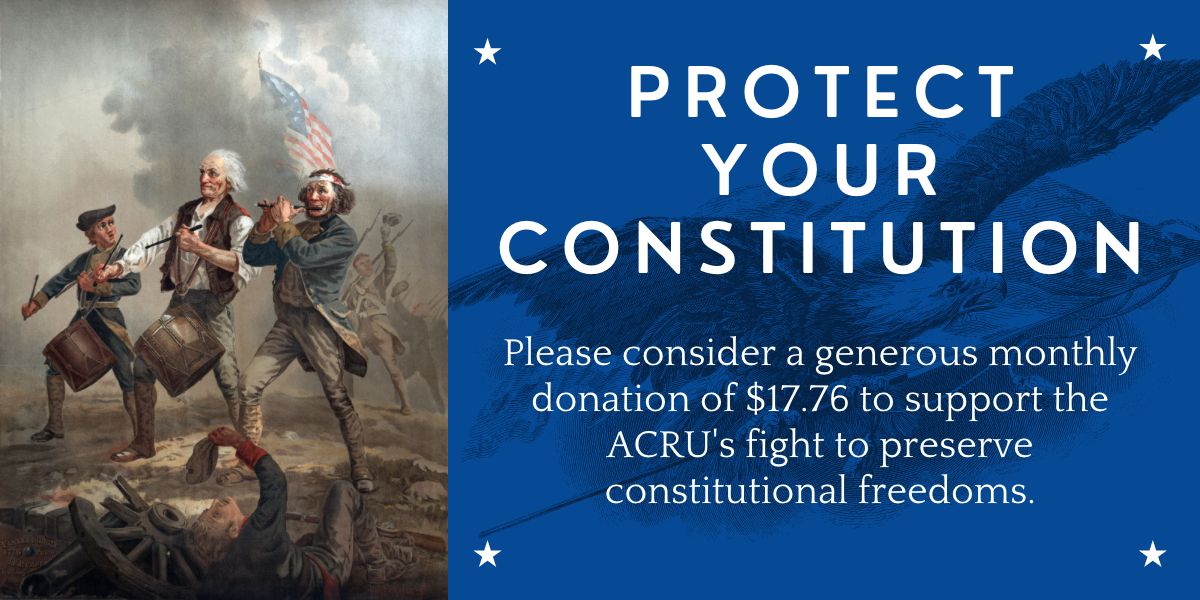Ken Klukowski: DISCLOSE Act Attacks Freedom of Speech
ACRU Staff
June 25, 2010
ACRU Senior Legal Analyst Ken Klukowski wrote this column appearing on WashingtonExaminer.com on June 24, 2010.
Congress is considering a censorship law to muzzle conservative groups, one that exempts pro-Democrat groups from its requirements, called the DISCLOSE Act. This blatant assault on the First Amendment is worse in some respects than McCain-Feingold, and should be a major focus during Elena Kagan’s Supreme Court confirmation hearings.
Modern campaign finance started with the 1976 Supreme Court case Buckley v. Valeo, where among other things the Court held that campaign contributions were protected by the First Amendment, but less protected than speech, and subject to disclosure requirements. Ever since then, campaign finance has been a complicated series of hits and misses.
The biggest miss was McConnell v. FEC in 2003, where the Court upheld the Bipartisan Campaign Reform Act (BCRA), better known as McCain-Feingold. By a 5-4 vote, the Court sustained BCRA’s provision that if Americans spoke through a public-interest group within 60 days of an election, those involved could spend five years in prison for committing a federal felony.
Thankfully, the Supreme Court rectified this travesty in Citizens United v. FEC, declaring, “Speech is an essential mechanism for democracy, for it is the means to hold officials accountable to the people…. The right of citizens to inquire, to hear, to speak, and to use information to reach consensus is a precondition to enlightened self-government and a necessary means to protect it.” The Court struck down BCRA’s “blackout periods,” restoring free speech to what it had been since 1791.
The reaction from the left was shameful, exemplified by Senator Chuck Schumer calling the decision “un-American.” But President Obama took the cake, condemning the Supreme Court to its face on national television in the State of the Union.
The justices sat motionless as the president humiliated them, mischaracterizing the Citizens United opinion, as they were surrounded in the House chamber by cheering (jeering?) congressional Democrats behaving like a bunch of thugs. This deplorable action was unprecedented in American history.
Democrats promised to get around the Citizens United ruling. (That’s a telling statement about the current Congress and administration, that they consider the Constitution something to “get around.”)
Their answer is the DISCLOSE Act, which is every bit as much an attempt to silence free speech as BCRA. Among other things, it requires that every group seeking to run political ads must show pictures and carry audio approvals from the organization’s head, the head of their largest contributor, and the names of the organization’s five top donors, whether or not they contributed to the message in question.
The end result of these onerous requirements is that of a 30-second TV or radio spot, perhaps 15 seconds will be consumed with these tedious, eye-glazing disclosures.
And by the way, labor unions are exempt from this law. Team Obama says, “We need disclosure!” Yet Team Obama’s storm troopers don’t need to disclose their activities, to the tune of hundreds of millions of dollars annually.
At least BCRA applied to unions. It was unconstitutional, but at least it went after both sides. DISCLOSE, by contrast, mostly criminalizes speech from conservative groups, while leaving liberals unfettered.
Fortunately, that may be its undoing. Because free speech is a fundamental right, an equal-protection challenge to it will be subject to what is called strict scrutiny. This law will not survive such an exacting standard in court.
Like BCRA, the DISCLOSE Act is unconstitutional. It runs afoul of both the First Amendment and the equal-protection guarantee of the Fifth Amendment. It exploits an unguarded area of law, taking disclosure requirements to an unprecedented level to the point where they swallow up the speaker’s message, and intimidate donors. It violates the spirit of the Supreme Court’s recent decision, if not the letter. And Team Obama is trying to cram it into law to stem their losses in the upcoming election.
If DISCLOSE passes, our only hope is that the Supreme Court decides it before the 2012 election. (Unfortunately 2010 would be a lost cause unless a court orders a preliminary injunction.)
That being the case, Elena Kagan should have to answer a lot of questions. She took a radical view of government censorship when arguing the Citizens United case, arguing that government can outlaw political pamphlets. Senators (like voters) have every right to know how those arguments apply to this law.
JOIN ACRU's PATRIOT CLUB



